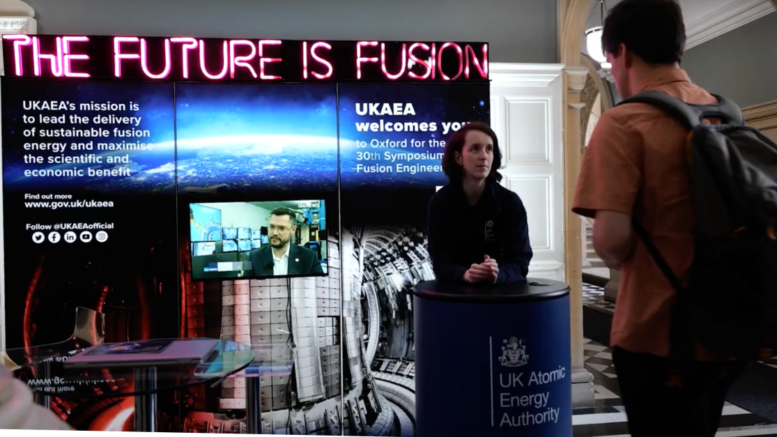Client: UK Atomic Energy Authority (UKAEA)
Event: 30th IEEE Symposium on Fusion Engineering (SOFE)
Location: Examination Schools, Oxford, UK
Objective: Host a comprehensive four-day conference to showcase advancements in fusion engineering, facilitate global collaboration, and position the UK as a leader in the fusion energy sector.
Background
The IEEE Symposium on Fusion Engineering (SOFE) is a key event for the fusion energy community, typically hosted in the United States. In 2019, UKAEA secured the bid to host the 2023 event in Oxford—only the second time the symposium has been held outside the US. The timing and location made this event particularly attractive, as it was the first in-person SOFE since 2019, and it coincided with growing interest in the private fusion sector.
With its proximity to the UKAEA’s facilities and the Joint European Torus (JET), Oxford provided an ideal backdrop. However, the venue, Examination Schools, a Grade II listed building, posed unique logistical challenges, especially as interest in the event soared.
Objectives and Challenges
The primary objectives of the event were to:
- Facilitate Knowledge Sharing: Offer a platform for fusion researchers and engineers to present their latest work.
- Promote UKAEA’s Leadership: Showcase the UK’s role in fusion research and encourage collaborations.
- Create Networking Opportunities: Enable attendees to connect through presentations, exhibitions, and social events.
Challenges:
- Unexpected Surge in Attendance: Previous SOFE events averaged around 350 attendees, but the Oxford location drew over 650 delegates, including a surge from the private sector.
- Space Constraints: The Examination Schools’ capacity was stretched, with limited room for the unexpected number of exhibitors, poster sessions, and catering.
- Historical Venue Limitations: Adapting a historic building to accommodate modern conference needs, including AV setups and accessibility, required careful planning.
Solution and Execution
The UKAEA team, alongside event agency TFI Lodestar, developed creative solutions to address these logistical challenges and deliver an exceptional event.
Creative Space Management
To manage the increased number of attendees and exhibitors, the team secured permission to set up a 20m x 20m marquee on the building’s quad, which housed additional poster displays, catering, and exhibitor booths. This solution provided a much-needed expansion of space, ensuring that the main conference hall could focus on presentations.
Innovative Use of Technology
Given the venue’s constraints, the team live-streamed presentations from the main plenary room to a secondary hall, offering delegates an alternative viewing space with the option to work during sessions. This hybrid setup allowed more flexibility in accommodating the overflow of participants.
Optimising Delegate Flow
To ensure smooth movement between sessions, poster presentations, and networking areas, UKAEA deployed a team of “human signage”—staff members positioned at key points to guide delegates. This approach was crucial in the early days of the conference as attendees familiarised themselves with the layout of the venue and the marquee.
Curated Social Events
Oxford’s historic charm was leveraged to create memorable networking experiences. Evening events included a gala dinner at St. Catherine’s College, a women’s dinner at the Randolph Hotel, and a young professionals’ reception at the Varsity Club. Additionally, guided tours of the UKAEA’s JET facility provided a direct connection to the cutting-edge research discussed at the conference.
Outcome and Impact
The event achieved significant success, exceeding expectations in several areas:
- Record-Breaking Attendance: Over 650 delegates from 22 countries attended, making it the largest SOFE ever. The event attracted a diverse audience, including scientists, engineers, and private sector representatives.
- High Engagement Levels: The addition of the marquee and thoughtful space management ensured that all exhibitors received strong exposure to delegates. The event included 17 exhibitor booths—more than any previous SOFE.
- Positive Feedback: Delegates praised the event’s organisation and the opportunity to reconnect in person after the pandemic. One participant remarked, “I’ve never seen so many fusion scientists together at the same time.”
Business Impact
Hosting the 30th SOFE enhanced the UKAEA’s reputation as a global leader in fusion research and fostered new partnerships:
- Strengthened Global Collaboration: The event facilitated connections between the UK fusion community and international peers, paving the way for future collaborations.
- Showcased UK Capabilities: The tours of UKAEA’s facilities allowed delegates to witness the advanced research capabilities available in the UK, leading to new discussions and project opportunities.
- Future Event Wins: Building on the success of SOFE, UKAEA has since been selected to host the International Spherical Torus Workshop in 2024 and the European Physical Society Plasma Physics Conference in 2026, further solidifying the UK’s role as a hub for fusion research.
Conclusion
The 30th IEEE Symposium on Fusion Engineering was a logistical triumph, transforming a historic Oxford venue into a modern conference space capable of hosting a record number of delegates. Through creative problem-solving, strategic partnerships, and an unwavering focus on attendee experience, UKAEA and TFI Lodestar delivered an event that not only met but exceeded the expectations of the global fusion community. The event underscored the importance of adaptability and collaboration in executing complex, large-scale conferences, setting a new standard for future gatherings in the fusion sector.

